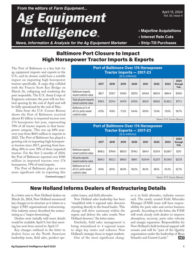One of John Deere's largest dealer networks in Canada is spreading its wings with the signing of a letter of intent (LOI) to acquire certain assets of Frontier Peterbilt Sales, a group of truck dealerships in Western Canada. Cervus Equipment announced the move on December 6.
"The signing of this LOI represents an opportunity for Cervus to enter into the transportation sector, further diversify its products and service offerings, and expand its regional presence," says Peter Lacey, president and CEO of Cervus.
The company, which is publicly traded on the Toronto Stock Exchange under the symbol "CVL," currently operates 30 dealership locations in Alberta, Saskatchewan and Manitoba selling Deere ag equipment, Bobcat and JCB construction equipment, as well as several brands of material handling machinery. It also holds an approximate 60% equity interest in Agriturf, a New Zealand-based dealer of John Deere equipment.
An Evolving Strategy
In a telephone interview with Ag Equipment Intelligence, Lacey said that the ongoing challenge of dealer succession in the industry has been the basis of Cervus' growth and expansion strategy since the company went public in 2000. Acquiring the truck dealerships is another step in this evolving strategy. "We look at this as a solution to the problem of dealer succession, so it applies to basically any kind of dealership. A few analysts have asked, 'Does this mean you can't consolidate any more John Deere stores?' No, it doesn't," Lacey says.
"At the same time, manufacturers have a concern about dealers getting too big, too quickly. We respect our OEMs; we're not going to go against their wishes. This allows us to actually take some pressure off because one of the challenges we've had as a public company is the OEMs saying, 'We're not sure we can feed your growth requirements as a public company.'"
With that, Lacey says Cervus looked at the opportunity for facilitating dealer succession in a lot of industries. "We asked ourselves, 'Why don't we look at being an equipment consolidator of a multitude of top brands?' This way we're not putting pressure on any one of our OEMs for our future growth or limiting our growth by being dependent on only one brand," he says.
"It's really a diversification of products, but the business model of running dealerships is essentially the same," Lacey explains.
"You sell equipment on behalf of an OEM, you take in trade-ins, you do the reconditioning and repair work for your customers, you sell parts, you do some rentals. Essentially the business model is identical, you just have different products and different customers."
Not a New Trend
Cervus isn't the first ag and construction dealership to move into the world of retail trucking. According to Ben Cherniavsky, analyst for Raymond James, a Caterpillar equipment dealer group did it between 2002 and 2005, before a conflict with Cat — which at the time was still selling its engines direct to truck manufacturers — forced it to jettison the idea.
"Privately held Redhead Equipment in Saskatchewan is another example of a dealer business structured under this model. Specifically, it sells and services Mack trucks in the province alongside its broad suite of agriculture and construction equipment (Case, Volvo, Terex). Following a restructuring of Caterpillar's engine business, both Finning and Toromont, along with other Cat dealers across North America, will be introducing the new CT660 Class 8 truck to the market next year," Cherniavsky said in a note to investors.
After it went public in 1997, RDO Equipment, one of Deere's largest equipment dealer networks, also added trucks to its product line up. Today, it continues to operate three RDO Truck Centers in North Dakota selling Mack and Volvo heavy duty trucks, Isuzu medium duty trucks and UD trucks.
"Reportedly, Frontier's revenues are currently in the $80 million range with margins that closely resemble Cervus' existing business," says Cherniavsky. "We see the potential for management to enhance these profit ratios over time as they implement their systems and best practices into the acquired operations.
"Unsurprisingly, Frontier's business is growing at a healthy clip right now, spurred by high levels of replacement demand, (akin to the construction market, owners of truck fleets deferred capex during the downturn) and robust activity in Saskatchewan's resource markets. Frontier's sales are heavily skewed toward vocational truck applications."




Post a comment
Report Abusive Comment